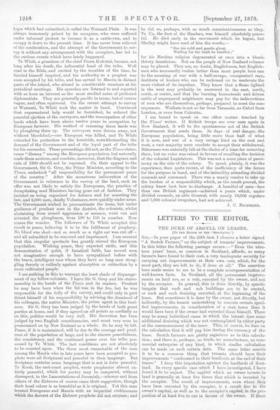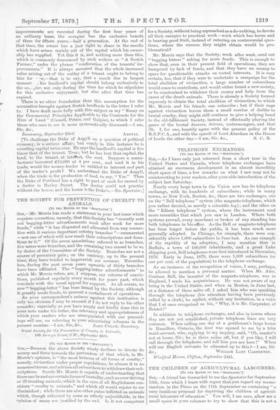LETTERS TO THE EDITOR.
THE DUKE OF ARGYLL ON LEASES.
(To THE EDITOR OF THE " SPECTATOR."] SIR,—In your paper of the 20th inst. I observe a letter signed "A Scotch Farmer," on the subject of tenants' improvements.. In this letter the following passage occurs :—" Even the nine- teen years' lease, so common in Scotland, affords, as many farmers have found to their cost, a very inadequate security for carrying out improvements at their own cost, which, for the most part, they are left to do, if done at all." The assertion here made seems to me to be a complete misrepresentation of well-known facts. In Scotland, all the permanent improve- ments on land are, as a rule, executed by the owner, and not by the occupier. In general, this is done directly, by specific bargain that such and uch buildings are to be erected,, or such and such draining executed, at the beginning of the lease. But sometimes it is done by the owner, not directly, but indirectly, by the tenant undertaking to execute certain ppeci- fled improvements, in consideration of a rent lower than it would have been if the owner had executed them himself. There may be many individual cases in which the tenant does some additional draining which was not contemplated by either party at the commencement of the lease. This, of course, he does on the calculation that it will pay him during the currency of the lease. Scotch farmers are pretty sagacious as to this calcula- tion; and there is, perhaps, no trade, no manufacture, no com- mercial enterprise of any kind, in which similar calculation can be made on such certain data. The same letter asserts it to be a common thing that tenants should have their improvements "confiscated to their landlords at the end of their leases." I deny this imputation against the landlords of Scot- land. In every specific case which I have investigated, I have found it to be unjust. The capital which an owner invests in land is generally at least five times that which is invested by the occupier. The result of improvements, even where they have been executed by the occupier, is a result due to the owner's capital, as well as to tho occupier's capital, in the pro- portion of at least five to one in favour of the owner. If these improvements arc executed during the first four years of an ordinary lease, the occupier has the exclusive benefit ,of them for fifteen years,—half a generation. At the end of that time, the owner has a just right to share in the results which have arisen mainly out of the capital which his owner- ship has supplied. Yet this it is, and nothing more than this, which is commonly denounced by such writers as "A Scotch Farmer," under the phrase "confiscation of the tenants' im- provements." It is always assumed that the whole increased value arising out of the outlay of a tenant ought to belong to him for -sr,—that is to say, that a result due in largest measurr ., his landlord's capital should belong exclusively to the oc.. tier, not only during the time for which he stipulates for this exclusive enjoyment, but also after that time has expired. There is no other foundation than this assumption for the accusation brought against Scotch landlords in the letter I refer to. I have dealt more fully with this Subject in my "Essay on the Commercial Principles Applicable to the Contracts for the Aire of Land" (Cassell, Fetter, and Galpin), to which I refer those who care to see it more systematically discussed.—I am, Sir, &c., [To challenge the Duke of Argyll on a question of political economy, is a serious affair; but surely in this instance he is counting capital twice over. He says the landlord's capital is five times that of the tenant. True ; but he has lent that capital, the land, to the tenant, at iutelkst, the rent. Suppose a manu- facturer borrowed 210,000 at 4 per cent., and used it in his trade, would the money-lender be entitled to interest and part of the trader's profit P We understand the Duke of Argyll, when the trade is the production of food, to say, yea,,, Then the Duke of Portland has a right to part of each fee earned by a doctor in Harley Street. The doctor could not practise without the house, and the house is the Duke's.—En. Spectator.]



































 Previous page
Previous page